Researchers Plan to Make Jellyfish the Next Lo-Cal Superfood
German scientists have actually predicted that people will soon be consuming jellyfish chips, since the marine animal has shown rich in protein and minerals.Researchers from the Leibniz Center for Tropical Marine Research in Bremen, Germany, have actually been examining these hardly-used food resources from the sea and their possible to become part of the human diet.Scientists say that fertile land, fresh water and mineral fertilizers
are becoming significantly limited as the world population is expected to reach 10 billion in the next 30 years.Because resource scarcity raises significant issues for worldwide food security, the Leibniz Center
team focused on more sustainable food sources from the sea.While jellyfish are known for their sting and propensity to mess up getaways, they have unique nutritional characteristics that don’t require much to maintain.In terms of marine protein sources, people frequently turn to big predatory fish like salmon or tuna. Jellyfish are high in protein like salmon and tuna however do not have nearly as much fat. They likewise contain many minerals and polyunsaturated fatty acids,” marine biologist Holger Kuhnhold said.Kunhold theorized that jellyfish might end up being an
“attractive low-calorie superfood”in the type of chips or protein powder.He holds high hopes for the mangrove jellyfish(Cassiopeia Andromeda) which could be cultivated in city environments by using modern LED technology.The Leibniz Center is
likewise examining other protein sources such as sea cucumbers.
German scientists have forecasted that individuals will soon be eating jellyfish chips, given that the marine animal has proven abundant in protein and minerals.Researchers from the Leibniz Center for Tropical Marine Research in Bremen, Germany, have actually been investigating these hardly-used food resources from the sea and their potential to become part of the human diet.Scientists state that fertile land, fresh water and mineral fertilizers
are becoming significantly scarce as the world population is expected to reach 10 billion in the next 30 years.Because resource deficiency raises major concerns for international food security, the Leibniz Center
team focused on more sustainable food sources from the sea.While jellyfish are understood for their sting and propensity to destroy holidays, they have distinct nutritional attributes that don’t need much to maintain.In terms of marine protein sources, people often turn to big predatory fish like salmon or tuna. Jellyfish are high in protein like salmon and tuna however do not have nearly as much fat. They likewise contain lots of minerals and polyunsaturated fatty acids,” marine biologist Holger Kuhnhold said.Kunhold thought that jellyfish could become an
“attractive low-calorie superfood”in the form of chips or protein powder.He holds high hopes for the mangrove jellyfish(Cassiopeia Andromeda) which could be cultivated in city environments by utilizing contemporary LED technology.The Leibniz Center is
likewise investigating other protein sources such as sea cucumbers.




















